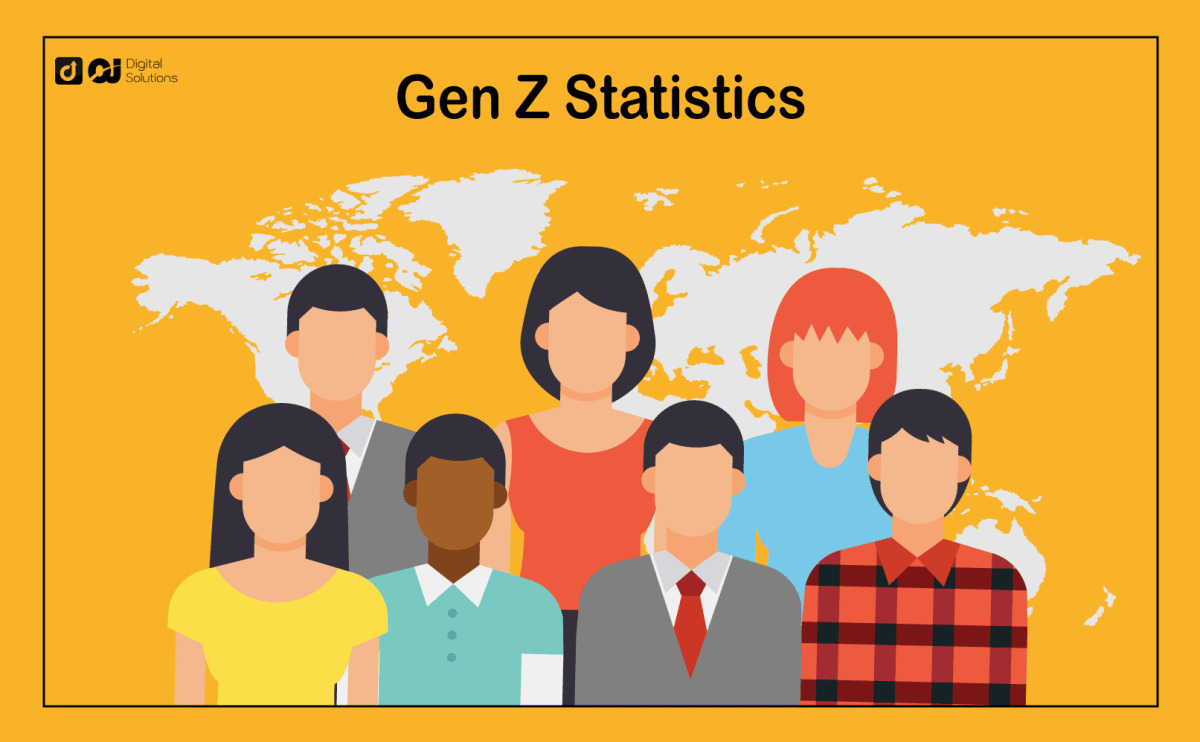Generation Z (also known as Gen Z or Gen Zers) is now one of the largest population groups worldwide. Statistics say Gen Zers make up approximately one-third of the global population.
But that’s not all.
If you want to know more about Generation Z, you’ve come to the right place.
I’ve compiled a list of Gen Z statistics highlighting how different Gen Zers are from other groups, specifically the older generations (Baby Boomers, Gen Xers, Millennials).
Let’s begin.
Gen Z Statistics: Who is Gen Z?
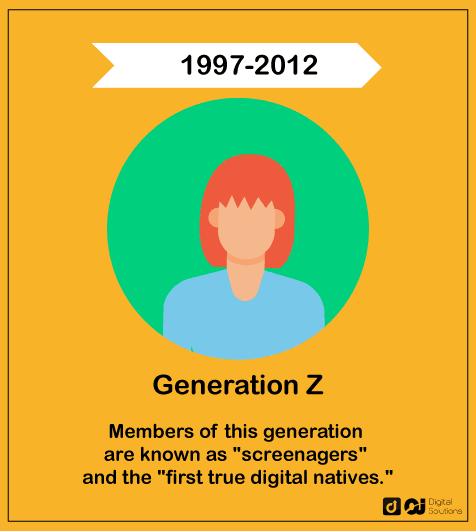
The Z in Generation Z stands for “zoomer.” Gen Zers are known as “zoomers” due to the widespread perception that their generation was the first to “zoom” the internet.
People started calling them “zoomers,” and the label stuck.
Generation Z is also known as the Internet generation, digital natives, centennials, and the iGeneration.
Gen Zers are people born between 1997 and 2012. The age range of these people is between 12 to 27 years, and most are still under 20.
Gen Z’s young adults are making significant contributions to the workforce.
Members of Gen Z are among the youngest people in the world today. The only age group younger than them are members of Generation Alpha, a new generation of individuals born after 2012.
Gen Z isn’t just about the birth year.
Gen Zers have mindsets and personal values shaped by their environment, upbringing, education, and culture.
Social media usage has made these young people more individualistic than older generations because they can quickly connect with friends or strangers worldwide.
They also care more about diversity and inclusion than older members of the population because they grew up in a globalized world where it was customary to interact with people from different backgrounds.
These young people are also the most diverse generation in the US.
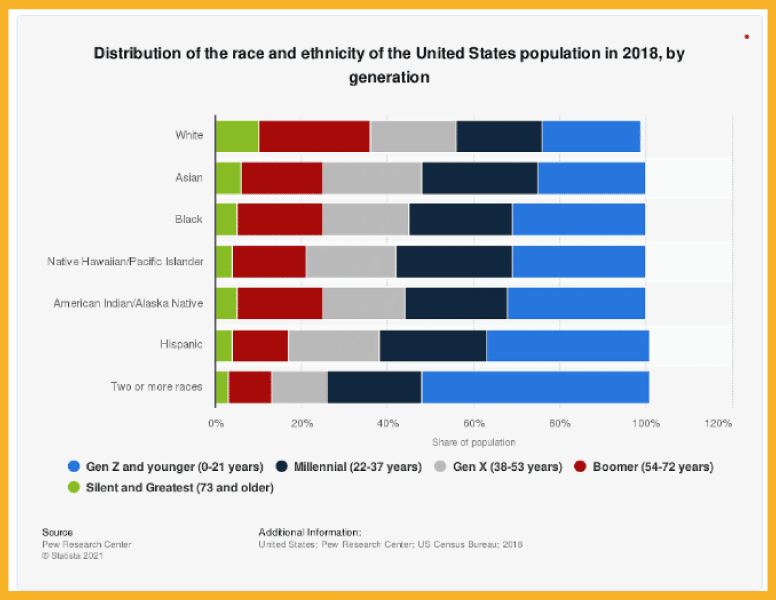
Image Source: Statista
Studies suggest that Generation Z comes from a wide range of cultural and ethnic origins, so they see the value of promoting diversity across society.
According to Pew Research Center, Gen Zers are intelligent and educated. Research indicates they have different educational approaches compared to other generations, like the previous generation of Millennials (Generation Y).
Gen Zers make their own educational choices. These young people tend to favor educational options that are less time and money-intensive and more career-oriented.
Members of Gen Z are more likely to finish a four-year college course, get higher education, and start working than previous generations.
It’s difficult to make broad assumptions about a whole generation, but Gen Zers tend to have a more leisurely pace than previous generations and are less willing to take risks. They are more focused on the future and can delay gratification for longer.
However, data suggests Generation Z has the highest incidence of mental illness and learning disorders compared to earlier generations.
Despite misconceptions that Gen Zers are tech-obsessed, the popularity of reading is increasing faster than in the previous three generations.
Most members of Generation Z push for social reform, racial equality, environmental protection, and climate change action.
Some have even become well-known, like Emma González. She is a survivor of the shooting at Marjory Stoneman Douglas High School in 2018, who came up with the March of our Lives Campaign with other survivors.
What Makes Gen Z Unique?
Here are some characteristics that make Generation Z stand out from older generations.
Gen Z Characteristics
Racial Diversity
A fundamental distinguishing trait of Generation Z is racial diversity.
Observations indicate parents (including single parents) bring up most Gen Zers from different ethnic backgrounds where gender roles are flexible. As a result, they are radically inclusive and less bothered by racial and religious differences, unlike previous generations.
Digital Upbringing
Generation Z is the first generation to grow up in a time of widespread technology and technological advancement. This generation has information at its fingertips, and social media use is part of everyday life.
Gen Zers have spent their entire lives connected to the digital world.
In contrast, Millennials witnessed the rise of the Internet while growing up in an era dominated by landline telephones and cable television.
Most Gen Zers can’t recall a time before cellphones, smartphones, and other electronic devices. They’re growing up in an era where access to streaming services and social media is always available.
However, these technological developments are a double-edged sword for Generation Z.
Gen Zers can access limitless information, expanding their academic capabilities. On the other hand, too much screen time can make them feel isolated and hinder their ability to interact with others.
Financially Concerned
Many of the oldest Gen Zers grew up seeing their parents struggle financially. Witnessing this struggle made Gen Z prioritize making investments and saving money.
This generation has matured to the point where they can change the financial conditions of their families.
In contrast to older generations who grew up during times of economic growth, Gen Z was shaped by how their families and communities dealt with the economy during their formative years.
Gen Zers tend to be more resourceful and careful with money. These younger consumers place a high value on the security that smart financial decisions, stable jobs, and profitable investments provide.
Career-Oriented
Gen Zers want a competitive pay and benefits package. These individuals focus on their future careers—they value career growth and job security.
This generation also wants benefits beyond the standard, emphasizing mental and physical health and inclusive policies.
Preference for Hybrid Work
81% of Gen Z workers want to be able to choose when and where they work. This generation wants to work in the most productive way possible and is willing to break traditional working techniques.
Gen Z workers prefer employers who trust their people, prioritize productivity rather than hours worked, and allow some flexibility. Most Gen Zers prefer a combination of in-office and remote work.
Concern for Mental Health
Gen Z is known as the “solitude generation” due to their excessive time online. Mental health experts warn that this can lead to despair and loneliness.
Few Gen Zers go out of their way to make friends. A more considerable percentage spend time watching Netflix or browsing on their phones.
The unstable state of the world has affected the mental health of Gen Zers. Many members of Genz Z have increased stress levels, internalizing the anger associated with gun control and police brutality issues.
Generation Z Trends
Generation Z is the fastest-growing generation in the US, making up about a quarter (27%) of the population. Gen Zers are slowly overtaking Millennials, gaining a more solid presence in today’s financial world.
Here are some of today’s Gen Z trends.
Driven by Technology
Generation Z is a highly influential group of digital trendsetters who enrich the tech industry’s future. These individuals don’t know any era when digital technology didn’t exist, making them tech natives.
95% of Gen Zers own smartphones, making them more technologically savvy.
Trends show Gen Z has a focus on technology. These individuals make waves in all aspects of the economy, meaning no industry can ignore them.
Immense Economic Power
The Gen Z population is growing older, meaning they will be the next batch of clients businesses will serve soon.
Understanding gen Z shoppers and their consumer behavior is a crucial marketing strategy for any business, given the considerable purchasing power of this generation.
Product Reviews
The influence of the Internet has led to Generation Z placing a high value on feedback. Most Gen Zers (almost nine out of ten) take the time to read reviews before making purchases.
Food Preferences
Gen Zers are health conscious and watch what they eat. They consider every nutritional component of their food and eat more plant-based food than Millenials.
Embracing Social Justice
Generation Z is the best example of people who care about social justice, climate change, and political issues.
The Pew Research Center says that more than half of Gen Zers are from different ethnic groups. These ethnically-diverse individuals want social justice reform.
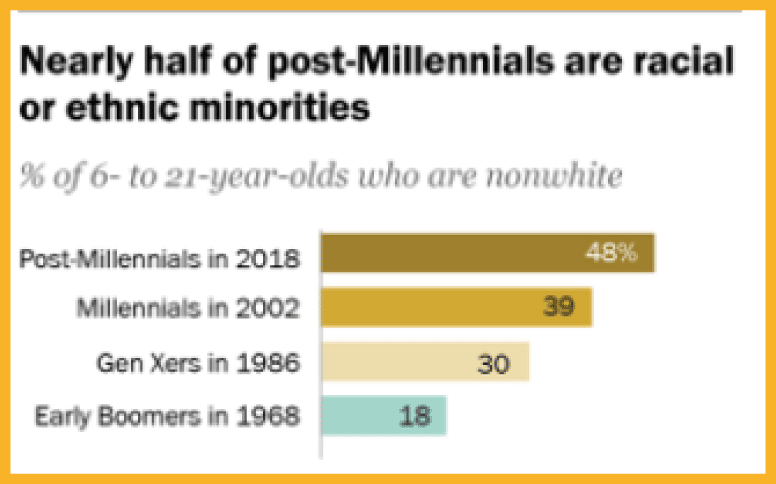
Image Source: Pew Research Center
Gen Z Facts
Gen Z is a generation born with technology—they are tech-savvy digital natives. Here are other interesting facts about Generation Z.
Technology
Generation Z grew up with access to smartphones, tablets, and social media. They learned about technology early, so they’re more comfortable with it than the previous generations.
Gen Zers mainly communicate online via email, text messages, and these instant messaging apps:
- TikTok
- Facebook Messenger
- Snapchat
- BeReal
They often use social media for entertainment, shopping, or socializing.
Gen Z is the first generation to have access to laptops at a young age, making them tech-savvy quickly.
Creativity
Generation Z is known for inventiveness when moving about the city. They use transport apps such as Uber and Lyft or take alternative modes of transportation like bikes, scooters, and even walking.
Education
Generation Z is a significant aspect of the education system.
85% of teens will have earned a high school diploma by age 17 compared to 61% among adults aged 25-34 who’ve obtained high school equivalency certificates.
Furthermore, Generation Z has no problem navigating the internet when doing extensive research for school work.
Relationships
Gen Zers are practical when dating. They don’t put as much value on long-term relationships as their older peers.
When Gen Zers are ready for a romantic partnership, they look for a partner who shares their core beliefs and principles (ex., veganism or vegetarianism) and refuse to settle for anything less.
On the other hand, baby boomers stayed in their relationships because they were committed to them. Today, many Millenials and Gen Z parents are divorced or have moved in with another partner.
Common Behaviors
Gen Zers tend to have solid ethics and ideals. They want the places they visit, the friends they choose, and the brands they buy to match their view of the world.
As such, younger generations like Gen Z (and Millennials) won’t hesitate to hold brands accountable for their actions.
Gen Zers are also more likely to do the following:
- Live with their parents for at least part of their life.
- Have multiple jobs, one of which is a side hustle, and retire early.
- Be successful entrepreneurs or business owners.
- Seek information from online sources like YouTube and Reddit rather than traditional news outlets.
- Listen to music while they work.
Generation Z and Social Media
The social media landscape is evolving with the people who use it.
Gen Z is a new generation of consumers. These individuals grew up surrounded by technology. They are also the most connected generation in history, with more than two-thirds of US Gen Zers owning smartphones.
The first generation to come of age with social media was the millennial generation, who grew up in the early 2000s. The second generation to grow up with social media is Gen Z.
Gen Zers are also taking their first steps into adult life after growing up in a different world from their predecessors. The Internet has become an integral part of life for Generation Z, and they use it differently than previous generations.
Gen Z Social Media Consumption Patterns
97% of Gen Zers say that social media is their primary source of ideas for what to buy. A brand’s marketing strategy should deliver genuine, helpful, non-manipulative content to attract Gen Zers.
Here’s how Gen Z uses social media.
Shopping
Generation Z is more likely to use social media to engage with their preferred brands and conduct product research. As a result, social media now plays an essential role in buying habits.
Gen Z consumers expect businesses to provide more than high-quality and affordable products. This age group cares more about a brand’s consistency, openness, and sustainability than older buyers.
They’re also very engaged in conversations with brands via Facebook Messenger and Instagram Stories.
Connecting With Friends
Gen Zers spend more time on social media than any other generation. They like to share what they’re doing with their friends via social media.
You should use social media to reach out to members of Gen Z if you’re an entrepreneur, small business owner, or decision-maker in a big-name brand.
Work
The work landscape has significantly changed over the past few years.
Today’s employers want people with a wide range of skills and experiences. They look for employees who can adapt to new technologies, processes, and methods.
Gen Zers stand out from Millennials in this area. The former has an increased awareness of global issues and a strong desire to work in teams or collaborate across borders to solve problems.
Conventional recruitment approaches won’t work with Generation Z. Marketing and Human Resources should use social media as a recruitment tool.
Using as many digital procedures as possible in the recruitment, hiring, and onboarding processes is best.
Social media is the new norm, and Gen Z has taken the lead on social media usage.
Gen Z Social Media Statistics
65% of Generation Z use social media daily. Their understanding of technological innovations has made them more appealing to brands and other businesses.
What makes Generation Z so attractive to brands?
First, Gen Zers are tech-savvy. They can engage with various business operations in different settings, particularly online businesses.
Second, Gen Zers spend most of their time on smartphones chatting or scrolling through images or videos on TikTok, Instagram, or Facebook. This time spent online makes Generation Z an easily-accessible audience for brands.
The image below illustrates how Generation Z uses different social media platforms.
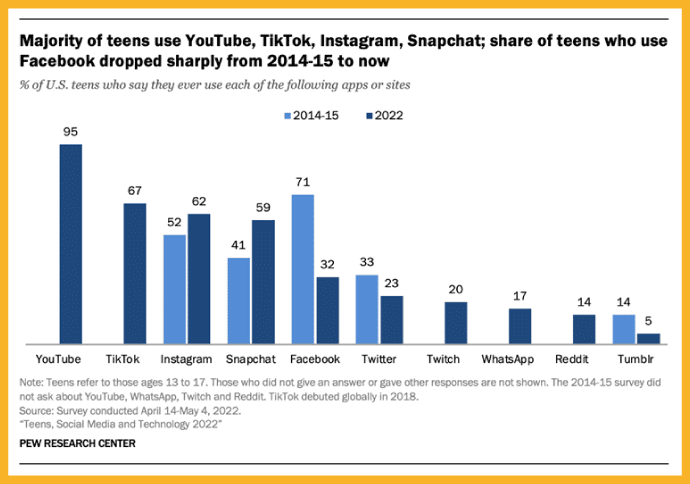
Credit: Pew Research Center
Data from Pew Research Center indicates that 95% of Gen Zers use YouTube, 67% use TikTok, and 61% use Instagram.
61% of Gen Z members prefer short-form video content. As a result, YouTube and TikTok are now more popular than other media sites.
59% of Gen Z users are likelier to share ads they find funny, while 57% are likelier to share ads they think are unique and cool.
Millennials and Gen Xers have more potential to share ads they feel would interest friends or family members.
44% of Gen Z like lifestyle and family-related YouTube videos. Meanwhile, 31% of Millennials and 37% of Gen Xers prefer technological content.
47% of Gen Z and 41% of Millennials favor lifestyle and family content on TikTok.
35% of Gen Xers are more inclined to watch sports, while 30% are interested in beauty content.
Brand owners should leverage these generational preferences when advertising to specific age groups.
The majority of Gen Z interactions are with YouTube video ads (32%), TikTok ads (40%), and advertisements (40%). Across all generations, advertisements are the most effective medium for purchases, with YouTube coming in second (25%).
Apple introduced a new app in 2020 called BeReal that is gaining popularity among Generation Z. Other generations are still unfamiliar with BeReal.
After receiving a message, users have two minutes to answer by posting on the app. BeReal is about quick updates, unlike other platforms where users spend time editing images and writing informational text.
Generation Z Marketing Trends and Strategies
Many marketers assume it’s difficult to market to Generation Z. Marketing to this generation involves more than selling.
Gen Z values promptness. A business has already lost Gen Z customers if it doesn’t do what it says it would immediately.
Businesses must show that they care to gain the brand loyalty of Generation Z. To meet Generation Z’s expectations, you must take time and understand what they want.
Here are the five critical marketing strategies to remember.
Personalization
Gen Z consumers want authentic connections with their preferred brands. Real-time conversations are essential to Generation Z.
When a brand shares content that makes Gen Z feel like they’re part of a community, they feel more involved. Their intense need to fit in can help brands reach more people.
When you personalize your marketing trends, you pique the interest of Gen Z customers and keep them coming back.
Eye-Catching Content
Brands should create engaging, attractive content that immediately grabs attention.
Generation Z likes memes and short videos that quickly get their point across. The faster you get your message across, the better. You only have a few seconds to show them why they should buy your product.
Most Gen Z prefer using their mobile devices, so ensuring your content is mobile-optimized is crucial.
Tags
Using the appropriate tags is essential for marketing to Generation Z. Tags have the following benefits:
- Allow sharing of photos and videos
- Encourage content creation from your audience
- Organize similar content under a single hashtag.
- Increase your brand visibility
Accountability
Gen Z values authentic brands that own their mistakes and flaws instead of hiding them. Gen Z prefers brands that acknowledge their shortcomings over those that portray perfection.
Gen Z also expects realistic responses demonstrating a business’s social responsibility. Company culture is significant, and brands should have matching internal and external ideals.
Community
Brands must foster community and genuine connections to attract Gen Z customers. Gen Z members like interacting with people who hold similar values.
Companies can make it easier for members of Gen Z to connect. Look for people with unique ideas who share the same values as Generation Z. You can use these people as ambassadors to help you reach more Gen Zers.
Generation Z Marketing
Generation Z is responsible for many significant behavioral and societal shifts we see today. This generation is making decisions with a global, long-term impact.
Brands who haven’t thought about these younger members of society now need to pay attention.
Here are strategies brands can use to attract the Gen Z audience.
Have Clear Goals and Values.
Brands should carefully consider their goals and values before starting their marketing efforts.
Here are some things to note about Gen Z when considering brand values.
- Gen Zers believe encouraging racial and cultural diversity benefits society.
- Gen Zers prefer buying from brands they believe contribute positively to society.
Brands must determine what they stand for and authentically showcase it to their Gen Z audience.
Create A Unique Brand Personality.
Gen Zers don’t want brands that look sleek. They want bold brands—brands that take risks.
Members of Gen Z would happily support a brand featuring plus-size models and other people they can connect with, such as persons with disabilities.
Entertain Them.
Generation Zers are excellent at sifting through online content.
However, they prefer short-form content because they have short attention spans. As such, you need to immediately grab their attention. One way to do this is by creating short, entertaining, and funny video content.
The Bottom Line
Hopefully, the Gen Z statistics I discussed in this guide helped you learn about Generation Z.
You can use the marketing strategies I outlined to reach more Gen Zers if you’re a business owner, marketer, or high-level brand manager.
If you’re looking for more statistics, online grocery shopping statistics might interest you.

